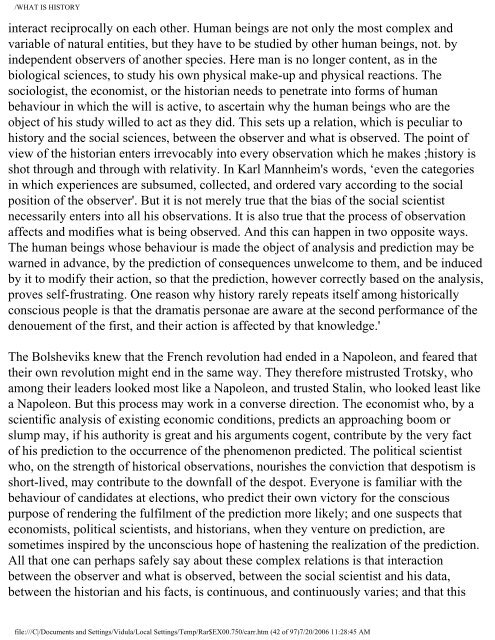What is History / by Edward Hallett Carr - Universal History Library
What is History / by Edward Hallett Carr - Universal History Library
What is History / by Edward Hallett Carr - Universal History Library
You also want an ePaper? Increase the reach of your titles
YUMPU automatically turns print PDFs into web optimized ePapers that Google loves.
WHAT IS HISTORY<br />
interact reciprocally on each other. Human beings are not only the most complex and<br />
variable of natural entities, but they have to be studied <strong>by</strong> other human beings, not. <strong>by</strong><br />
independent observers of another species. Here man <strong>is</strong> no longer content, as in the<br />
biological sciences, to study h<strong>is</strong> own physical make-up and physical reactions. The<br />
sociolog<strong>is</strong>t, the econom<strong>is</strong>t, or the h<strong>is</strong>torian needs to penetrate into forms of human<br />
behaviour in which the will <strong>is</strong> active, to ascertain why the human beings who are the<br />
object of h<strong>is</strong> study willed to act as they did. Th<strong>is</strong> sets up a relation, which <strong>is</strong> peculiar to<br />
h<strong>is</strong>tory and the social sciences, between the observer and what <strong>is</strong> observed. The point of<br />
view of the h<strong>is</strong>torian enters irrevocably into every observation which he makes ;h<strong>is</strong>tory <strong>is</strong><br />
shot through and through with relativity. In Karl Mannheim's words, ‘even the categories<br />
in which experiences are subsumed, collected, and ordered vary according to the social<br />
position of the observer'. But it <strong>is</strong> not merely true that the bias of the social scient<strong>is</strong>t<br />
necessarily enters into all h<strong>is</strong> observations. It <strong>is</strong> also true that the process of observation<br />
affects and modifies what <strong>is</strong> being observed. And th<strong>is</strong> can happen in two opposite ways.<br />
The human beings whose behaviour <strong>is</strong> made the object of analys<strong>is</strong> and prediction may be<br />
warned in advance, <strong>by</strong> the prediction of consequences unwelcome to them, and be induced<br />
<strong>by</strong> it to modify their action, so that the prediction, however correctly based on the analys<strong>is</strong>,<br />
proves self-frustrating. One reason why h<strong>is</strong>tory rarely repeats itself among h<strong>is</strong>torically<br />
conscious people <strong>is</strong> that the dramat<strong>is</strong> personae are aware at the second performance of the<br />
denouement of the first, and their action <strong>is</strong> affected <strong>by</strong> that knowledge.'<br />
The Bolsheviks knew that the French revolution had ended in a Napoleon, and feared that<br />
their own revolution might end in the same way. They therefore m<strong>is</strong>trusted Trotsky, who<br />
among their leaders looked most like a Napoleon, and trusted Stalin, who looked least like<br />
a Napoleon. But th<strong>is</strong> process may work in a converse direction. The econom<strong>is</strong>t who, <strong>by</strong> a<br />
scientific analys<strong>is</strong> of ex<strong>is</strong>ting economic conditions, predicts an approaching boom or<br />
slump may, if h<strong>is</strong> authority <strong>is</strong> great and h<strong>is</strong> arguments cogent, contribute <strong>by</strong> the very fact<br />
of h<strong>is</strong> prediction to the occurrence of the phenomenon predicted. The political scient<strong>is</strong>t<br />
who, on the strength of h<strong>is</strong>torical observations, nour<strong>is</strong>hes the conviction that despot<strong>is</strong>m <strong>is</strong><br />
short-lived, may contribute to the downfall of the despot. Everyone <strong>is</strong> familiar with the<br />
behaviour of candidates at elections, who predict their own victory for the conscious<br />
purpose of rendering the fulfilment of the prediction more likely; and one suspects that<br />
econom<strong>is</strong>ts, political scient<strong>is</strong>ts, and h<strong>is</strong>torians, when they venture on prediction, are<br />
sometimes inspired <strong>by</strong> the unconscious hope of hastening the realization of the prediction.<br />
All that one can perhaps safely say about these complex relations <strong>is</strong> that interaction<br />
between the observer and what <strong>is</strong> observed, between the social scient<strong>is</strong>t and h<strong>is</strong> data,<br />
between the h<strong>is</strong>torian and h<strong>is</strong> facts, <strong>is</strong> continuous, and continuously varies; and that th<strong>is</strong><br />
file:///C|/Documents and Settings/Vidula/Local Settings/Temp/Rar$EX00.750/carr.htm (42 of 97)7/20/2006 11:28:45 AM







